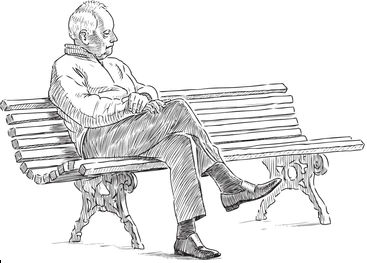
However, when his children—two sons and a daughter—discover his plan, their reactions reveal their true priorities. Rather than appreciating their father's generosity, they view it as a threat to their inheritance. Fueled by greed, they devise a deceitful plan to eliminate Deepak from their lives and secure the property for themselves. They convince him to accompany them on a pilgrimage to Varanasi, using his religious faith and fading memory to manipulate him. Once there, they abandon him at a busy ghat, pretending it’s part of a ritual. They return to Shimla and falsely report him dead, acquiring ownership of the house through forged documents.
Alone and disoriented in a strange city, Deepak is left to fend for himself among the chaos of Varanasi. His identity slips away as dementia begins to affect him more severely. Wandering the ghats, temples, and streets in a daze, Deepak becomes one among many abandoned elders, invisible to the world.
Here enters Veeru, a local orphan and small-time thief. Veeru survives on the margins of society, picking pockets and running errands for small-time gangsters. He initially sees Deepak as an easy target but quickly realizes the old man is not just lost—he’s been betrayed. Something about Deepak’s helplessness and quiet dignity moves Veeru. Despite his own difficult life, Veeru chooses to help him.
Veeru, along with his kind-hearted girlfriend Meena, takes Deepak under his wing. They help him find food, shelter, and begin piecing together fragments of his past through conversations and documents Deepak still carries. As they grow closer, Veeru uncovers a deeper issue—Deepak isn’t the only one abandoned. Varanasi, often considered a spiritual destination for salvation, has become a dumping ground for elderly parents discarded by their families.
During their search for a safe place for Deepak, Veeru and Meena stumble upon an ashram that offers shelter for abandoned elders. Initially hopeful, they soon discover it’s a front for a sinister organ trafficking ring. The criminals prey on the vulnerability of the elderly, exploiting them under the guise of care. Deepak narrowly escapes being harvested for his organs, saved just in time by Veeru and Meena.
Realizing the extent of corruption and inhumanity around them, Veeru decides it’s time to fight back—not just to save Deepak, but to expose a system that enables such cruelty. They document the ashram’s illegal operations with hidden cameras and reach out to a local journalist willing to publish their findings.
The expose becomes a national sensation. News channels pick up the story of Deepak Tyagi—an elderly father with dementia, abandoned by his children, nearly killed in an organ harvesting scam. Public outrage explodes. The case becomes a symbol of a decaying moral compass in urban India, sparking a debate around parental neglect, elder rights, and the commercialization of compassion.
Faced with nationwide condemnation and legal scrutiny, Deepak’s children are forced to reckon with their actions. Their reputations are destroyed. But in a twist that underscores the moral strength of the film, Deepak refuses to return to them. He declares that those who turned their back on him in his time of need are no longer his family. Instead, he chooses to live with Veeru and Meena—strangers who treated him with more love, empathy, and respect than his own blood.
In the final act, Deepak, now more lucid with treatment and stability, becomes a voice for abandoned seniors. With Veeru’s help, he helps set up a legitimate shelter for the elderly in Varanasi—a place of real care, dignity, and second chances. Veeru, once a thief, transforms into a social crusader, inspired by Deepak’s resilience. Meena continues to support their cause, and together, they form a new kind of family—built not on blood, but on compassion and shared humanity.
